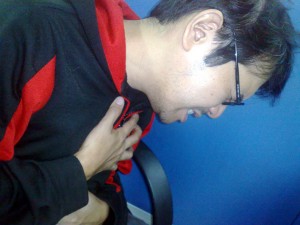There are plenty of reasons to celebrate the coming new year and more often we do this by bingeing on high-fat, high-calorie foods, indulging in alcoholic beverages and staying up until the wee hours.

‘ATTACKED’. Bingeing on high-fat, high-calorie foods, alcoholic beverages and nearly non-stop 24/7 holiday merrymaking cause undue stress to our heart. Amid the revelry, remember to stay alive for the New Year. NOY MORCOSO/INQUIRER.NET
Some even stress themselves out with overscheduling, fighting the holiday crowds at the mall, taking charge of parties or reunions and trying to create the perfect holiday celebration.
The outcome of all of these could not only be a serious headache, warned Dr. Adolfo Bellosillo, head of the Makati Medical Center’s Cardiac Rehabilitation and Preventive Cardiology Unit.
Reminder
“It could also be fatal. And one thing that I should remind the public of is the one we termed as ‘sudden cardiac death,’ which could occur even in active, seemingly fit and healthy individuals with no known heart disease,” said Bellosillo, who is also the founding president of the Foundation for Lay Education on Heart Diseases.
Sudden cardiac death is a term used to describe a situation in which the heart stops working, abruptly and without warning, so no blood can be pumped to the rest of the body, especially the brain.
It occurs when the heart’s electrical system malfunctions as a result of heart rhythm disorder called ventricular fibrillation or the quivering of the heart’s lower chambers or ventricular tachycardia or the extremely rapid but ineffective beating of the heart’s lower chambers.
“This irregular heart rhythm causes the heart to suddenly stop pumping blood to the rest of the body. If blood does not flow to the brain it becomes starved of oxygen, and the person loses consciousness in a matter of seconds. Death can occur within minutes,” Bellosillo warned.
He noted that sudden cardiac death is no longer only for older, overweight men with high cholesterol and high blood pressure.
Not arbitrary
“We are seeing patients in their 40s come in with heart disease due to self-inflicted risk factors. Even those, who work out and eat healthy, are also at risk. In reality sudden cardiac death is not an arbitrary incident,” Bellosillo explained.
“A huge number of those who die of sudden cardiac death show signs of a previous heart attack. In the young adults, other heart abnormalities, including congenital ones, have been attributed. In very few cases, various heart medications and the use of some illegal drugs were the cause of abnormal heart rhythms,” he said.
Indeed, sudden cardiac death is one serious issue that it will become the topic of FLEHD’s upcoming 12th national annual convention on preventive cardiology for physicians.
With the theme “Sudden cardiac death: prevention through better understanding of the basics, triggers, risk factors and management,” Bellosillo explained that the three-day free lecture cum seminar (slated from Jan. 26 to 28 at the Carlos P. Romulo Auditorium, RCBC Plaza, Ayala Avenue, Makati City) will even benefit lay persons who would wish to attend.
“This is the first time that a seminar will delve on the issue of sudden cardiac death. It is very timely, considering the increasing cases doctors are encountering in recent years. We have invited several cardiac experts who will shed light on this issue. There will be case presentations as well as discussions and the physicians who will be attending, will realize that a simple and inexpensive electrocardiogram as well as exercise stress testing may turn out as effective and helpful tool in alerting if their particular patient is prone to sudden cardiac death,” the doctor enumerated.
While it’s true that more than 60 percent of heart attacks have to do with simple lifestyle issues, such as diet, exercise and cigarette smoking, and easy to detect and treat medical issues such as high blood pressure and high cholesterol, research has shown that even those who watch their diet, exercise and avoid smoking and excessive alcohol are also prone to sudden cardiac death.
Stress
According to the 2004 Interheart study in the Lancet, stress is one of three main risk factors for coronary artery disease, and is responsible for a fifth of heart attacks worldwide.
“Because of this, make an appointment to be evaluated. If you have a family history of heart attacks, or you think you’re at risk, spend 45-minutes to an hour with a preventive cardiologist at your local hospital. The evaluation and blood test will reveal your HDL and LDL cholesterol, triglycerides, fasting lipid profile, blood pressure and family history. Don’t wait until you are in your 50s to get a formal assessment,” Bellosillo said.
From this checkup, the doctor will be able to determine if you need to have a noninvasive scan of your heart to look for problems, or if you need to be prescribed medication like statins.
He also advised not to deny cardiac symptoms such as shortness of breath or chest pains as a result of exertion.
Bellosillo reiterated: “Because there are few warning signs or symptoms to identify people at risk, and since sudden cardiac death is by definition fatal, there are few survivors to spread the word about this devastating killer.”